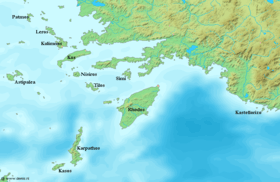Operation Accolade
During World War II, Operation Accolade was a planned British amphibious assault on Rhodes and the Dodecanese Islands in the Aegean Sea.[1] Advocated by the British Prime Minister, Winston Churchill, as a follow-up to the capture of Sicily in 1943 from Operation Husky, it was cancelled on 25 December 1943 to focus on the assault on Anzio.[1] The allies did not, then, gain all of the Dodecanese. Most notably, the Germans still had possession of Rhodes. The operation in the Dodecanese, though, kept many German troops occupied in the area.[2]

The Chief of the Imperial General Staff (CIGS) Alan Brooke was opposed to Churchill's "Rhodes madness", saying he had "worked himself into a frenzy of excitement about the Rhodes attack". Alan Brooke was opposed to it as a distraction from the Italian campaign and also as endangering their relations with the President (6,8 October 1943)[3], although he also thought that Crete and Rhodes might have been easily captured earlier if the Americans had agreed, and "the war might have been finished by 1943". (1 November 1943) [4]
See also
References
- FCO Historians (March 2005). "The Cicero Papers". Foreign and Commonwealth Office. Retrieved May 28, 2016.
- Richard C. Hall (9 October 2014). "Dodecanese Campaign, 1944". War in the Balkans: An Encyclopedic History from the Fall of the Ottoman Empire to the Breakup of Yugoslavia. ABC-CLIO. pp. 403–404. ISBN 978-1-61069-031-7.
- Alanbrooke 2001, pp. 458,459.
- Alanbrooke 2001, pp. 465,466.
Further reading
- Alanbrooke, Field Marshal Lord (2001). War Diaries 1939–1945. Phoenix Press. ISBN 1-84212-526-5.
- Michael Arnold (19 February 2015). Hollow Heroes: An Unvarnished Look at the Wartime Careers of Churchill, Montgomery and Mountbatten. Casemate. pp. 207–208. ISBN 978-1-61200-274-3.
- Max Hastings (27 April 2010). Winston's War. Knopf Doubleday Publishing Group. pp. 324, 325. ISBN 978-0-307-59312-2.
- Nigel Knight (1 April 2012). Churchill the Greatest Briton Unmasked. David & Charles. p. 201. ISBN 0-7153-3407-7.
- John Sadler (19 November 2015). Ghost Patrol: A History of the Long Range Desert Group, 1940Ð1945. Casemate. pp. 161–163. ISBN 978-1-61200-337-5.
- War in the Aegean: The Campaign for the Eastern Mediterranean in World War II. Stackpole Books. 2008. pp. 36–47. ISBN 978-0-8117-4637-3.